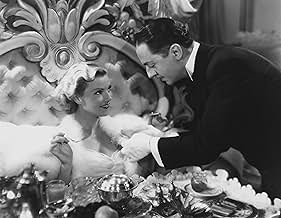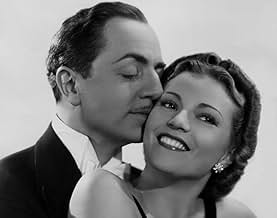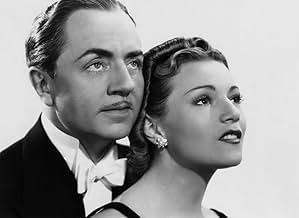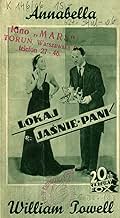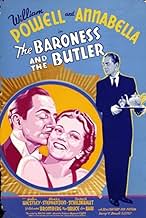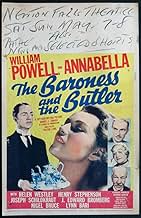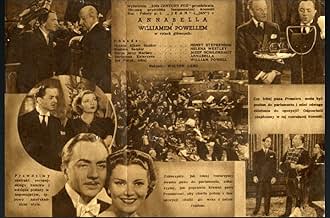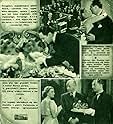Un mayordomo es elegido al parlamento húngaro donde se opone al gobierno de su amo.Un mayordomo es elegido al parlamento húngaro donde se opone al gobierno de su amo.Un mayordomo es elegido al parlamento húngaro donde se opone al gobierno de su amo.
- Dirección
- Guionistas
- Elenco
- Premios
- 2 premios ganados en total
Ivan F. Simpson
- Count Dormo
- (as Ivan Simpson)
Sidney Bracey
- Member of Parliament
- (as Sidney Bracy)
Opiniones destacadas
... OR "Mr. Godfrey Goes to Budapest". So, yes, it's a pretty obvious rework of "My Man Godfrey" from 1936. But then "The Star of Midnight" and "The Ex Mrs. Bradford" were reworkings of "The Thin Man" formula and they worked.
Johan Porok (William Powell) is a third generation head butler to Count Sandor (Henry Stephenson) and his family. The count praises him for his dedication to "all of the ancient arts" of being a perfect servant. Count Sandor is prime minister of Hungary, so he is naturally interested in the outcome of the parliamentary elections. To his surprise, his butler Johan has been elected to a seat in parliament. Here is my first problem. How could Sandor's own butler be running for parliament and the prime minister not be aware?
Johan ran on the progressive ticket, and the count is a member of the conservative party, so they are at odds politically speaking. And Johan quickly rises to be a leader in his party, largely by regularly skewering his employer's performance in office. Sandor doesn't mind this, but his daughter the titular baroness (Annabella), does seem to mind a great deal. Here's some more weirdness to ponder. The baroness is married to the Baron Georg Marissey (Joseph Schildkraut), but routinely sleeps in her old room at her parents' house. She is apparently somewhat estranged from the baron although not truly separated. With Schildkraut in the part of the baron, one can only assume it is because he is some kind of slimy little weasel - Schildkraut excelled at such roles - but the source of her initial antipathy is never really revealed.
The title and having watched "My Man Godfrey" will somewhat give the outcome away, but how this happens within the bounds of the production code is something you will have to watch and find out yourself. Besides what I already mentioned, there was just something off about this production. For one thing, Annabella's accent makes her almost incomprehensible at times. I also never feel any authenticity in the Baroness' positive feelings towards Johan.
It was fun watching Powell play a politician for a change, though. He is quite the socialist in this production. He advocates redistributing farmland to the peasants - Hey Johan who exactly is going to have to "donate" this land in your scheme? - and he also advocates a reduction in armaments. If Johan recognized the winds of war that were in the air in Europe in1938, perhaps he would want to hold on to those armaments.
I'd say this film is probably a 6.5 rather than a 6 or a 7/10 if I was permitted a score with more granularity.
Johan Porok (William Powell) is a third generation head butler to Count Sandor (Henry Stephenson) and his family. The count praises him for his dedication to "all of the ancient arts" of being a perfect servant. Count Sandor is prime minister of Hungary, so he is naturally interested in the outcome of the parliamentary elections. To his surprise, his butler Johan has been elected to a seat in parliament. Here is my first problem. How could Sandor's own butler be running for parliament and the prime minister not be aware?
Johan ran on the progressive ticket, and the count is a member of the conservative party, so they are at odds politically speaking. And Johan quickly rises to be a leader in his party, largely by regularly skewering his employer's performance in office. Sandor doesn't mind this, but his daughter the titular baroness (Annabella), does seem to mind a great deal. Here's some more weirdness to ponder. The baroness is married to the Baron Georg Marissey (Joseph Schildkraut), but routinely sleeps in her old room at her parents' house. She is apparently somewhat estranged from the baron although not truly separated. With Schildkraut in the part of the baron, one can only assume it is because he is some kind of slimy little weasel - Schildkraut excelled at such roles - but the source of her initial antipathy is never really revealed.
The title and having watched "My Man Godfrey" will somewhat give the outcome away, but how this happens within the bounds of the production code is something you will have to watch and find out yourself. Besides what I already mentioned, there was just something off about this production. For one thing, Annabella's accent makes her almost incomprehensible at times. I also never feel any authenticity in the Baroness' positive feelings towards Johan.
It was fun watching Powell play a politician for a change, though. He is quite the socialist in this production. He advocates redistributing farmland to the peasants - Hey Johan who exactly is going to have to "donate" this land in your scheme? - and he also advocates a reduction in armaments. If Johan recognized the winds of war that were in the air in Europe in1938, perhaps he would want to hold on to those armaments.
I'd say this film is probably a 6.5 rather than a 6 or a 7/10 if I was permitted a score with more granularity.
Hungarian Prime Minister "Count Albert" (Henry Stephenson) is having a family breakfast on the morning after the election when he hears news on the radio that his butler "Johann" (William Powell) has been elected to Parliament - and for the opposition party too! He's quite a savvy and decent old chap and offers his congratulations. In turn, "Johann" promises to continue to take care of his master whilst performing his new parliamentary duties. It turn out that he's quite an effective politician and that although they are not quite of the same social class, he and the "Baroness" (Annabella) - who is married to "Baron Georg" (Joseph Schildkraut) - start one of those love/hate relationships that can only end one way. With the odd, slightly confusing, appearance from Nigel Bruce and a Stephenson who looks like he's enjoying the mischief of it all, I found this to be an entertaining swipe at the principles of declining aristocratic rule and of the aspiring hope of the people in a new order with all of the same problems. Powell is on good form here but Annabella isn't very natural nor entirely at home with the English language. Still - as "Johann" says - "there are always difficulties"! I quite enjoyed this.
This is a most delightful movie in every sense. And one that deserves to be known far better than it is. The story of a conscientious butler who works for the Prime Minister of his country, Hungry, but, unknown to his employer, has political aspirations of his own.
This is a wonderfully witty script that never flags. And such a fine cast. William Powell is irrepressible as ever as the caring butler who however isn't afraid to speak his mind in parliament when leading his party in opposition to his employer played by Henry Stevenson, whose wry amusement when Powell's character criticises him in front of everybody in Parliament is hilarious.
But the real revelation here is Annabella, who is simply sparkling as the Baroness, who is also the Prime Minister's daughter. Not only is she very beautiful but also a fine actress. Annabella is so vibrant and expressive in this part that she is just a joy to watch in every scene she plays, especially in those with Powell. They had great chemistry. And it would have been nice to see more of them together.
It seems like Zanuck tried to wreck Annabella's career when she became involved with Tyrone Power. What a sad mistake on Zanuck's part as one can clearly see from this movie that Annabella had a style and panache that would surely have made her a great star. This movie is excellent entertainment and well worth seeing.
This is a wonderfully witty script that never flags. And such a fine cast. William Powell is irrepressible as ever as the caring butler who however isn't afraid to speak his mind in parliament when leading his party in opposition to his employer played by Henry Stevenson, whose wry amusement when Powell's character criticises him in front of everybody in Parliament is hilarious.
But the real revelation here is Annabella, who is simply sparkling as the Baroness, who is also the Prime Minister's daughter. Not only is she very beautiful but also a fine actress. Annabella is so vibrant and expressive in this part that she is just a joy to watch in every scene she plays, especially in those with Powell. They had great chemistry. And it would have been nice to see more of them together.
It seems like Zanuck tried to wreck Annabella's career when she became involved with Tyrone Power. What a sad mistake on Zanuck's part as one can clearly see from this movie that Annabella had a style and panache that would surely have made her a great star. This movie is excellent entertainment and well worth seeing.
"The Baroness and the Butler" is a 1938 film starring William Powell and the French star signed by 20th Century Fox, Annabella, who got the big star buildup from Fox. Little did Darryl F. Zanuck know that she was more interested in matters of the heart than career. When she met and fell in love with Tyrone Power on her next film, "Suez," Zanuck tried to get rid of her by offering her films in Europe. She refused to leave Power (and who could blame her) and the two married, becoming the Brangelina of their era. Zanuck blacklisted her, and there went the star buildup and the big film career.
This is a charming film set in Hungary, about a butler, Johann Porok (Powell) who works for the Prime Minister (Henry Stephenson). The prime minister and his family, particularly his daughter Katrina (Annabella) are shocked when Johann is elected to Parliament - by the opposition party. What's more, he wants to stay on as butler. Meanwhile, Katrina's philandering husband (Josef Schildkraut) has a few political ambitions of his own.
Powell does a smooth job in this film as the elegant butler who is known for his brilliant speeches in Parliament. Stephenson is great as his amused boss, and Schildkraut, who played so many slimeballs, is terrific as usual. Annabella was a wonderful actress, and when her film career took a nosedive thanks to Zanuck, she and Power did radio shows together. Annabella also had a great success on Broadway, did "Liliom" with her husband in Westport Connecticut, and worked tirelessly for the war effort before returning to France when she and Power divorced.
"The Baroness and the Butler" isn't a great film, but it has good performances and a breeziness about it. Enjoyable if predictable.
This is a charming film set in Hungary, about a butler, Johann Porok (Powell) who works for the Prime Minister (Henry Stephenson). The prime minister and his family, particularly his daughter Katrina (Annabella) are shocked when Johann is elected to Parliament - by the opposition party. What's more, he wants to stay on as butler. Meanwhile, Katrina's philandering husband (Josef Schildkraut) has a few political ambitions of his own.
Powell does a smooth job in this film as the elegant butler who is known for his brilliant speeches in Parliament. Stephenson is great as his amused boss, and Schildkraut, who played so many slimeballs, is terrific as usual. Annabella was a wonderful actress, and when her film career took a nosedive thanks to Zanuck, she and Power did radio shows together. Annabella also had a great success on Broadway, did "Liliom" with her husband in Westport Connecticut, and worked tirelessly for the war effort before returning to France when she and Power divorced.
"The Baroness and the Butler" isn't a great film, but it has good performances and a breeziness about it. Enjoyable if predictable.
A charming movie, in particular for those whose film tastes are simple, requiring clean, wholesome entertainment, certainly something rare on the screen in the 21st Century. Powell was Powell, articulate, debonair, and likable. But this was my first view of Annabella; what a lovely creature; more accurately, stunningly beautiful, at least to me. The cast did well depicting the almost unbelievable etiquette that those of us born in or after WW II just do not understand. I guess this was the objective in the simplistic plots of the time--to bring only a sense of peace and pleasure to audiences in a time (WW II) when such peace and pleasures were thought to probably never exist again. I cannot find a lot of information on Annabella, but she apparently had a long and distinguished film career. Too bad I didn't know about her in my youth. The film is certainly another 'feather in the hat' of a time in films that many of us remember and enjoyed.
¿Sabías que…?
- TriviaThe film was rejected by the censors in Quebec, Canada while the Romanian censors removed all references to Hungary.
- ErroresEarly in the film, Powell's character can be seen using a tea trolley with a large map of and coat of arms prominently displayed on its back. Both represent Australia, not Hungary, where the film is set.
- Citas
Johann Porok: My congratulations sir.
Count Albert Sandor: For what?
Johann Porok: Your triumph.
Count Albert Sandor: Oh - that. You'd think at my age I'd have sense enough to get out of politics instead of wasting all my time with a lot of nincompoops and parasites.
- ConexionesReferenced in Hollywood Hist-o-Rama: William Powell (1961)
- Bandas sonorasTales From the Vienna Woods Op. 325
(1868) (uncredited)
Written by Johann Strauss
In the score for the opening scenes
Selecciones populares
Inicia sesión para calificar y agrega a la lista de videos para obtener recomendaciones personalizadas
- How long is The Baroness and the Butler?Con tecnología de Alexa
Detalles
- Fecha de lanzamiento
- País de origen
- Idioma
- También se conoce como
- Baronica in njen sluga
- Locaciones de filmación
- Budapest, Hungría(Stock Footage)
- Productora
- Ver más créditos de la compañía en IMDbPro
- Tiempo de ejecución1 hora 20 minutos
- Color
- Relación de aspecto
- 1.37 : 1
Contribuir a esta página
Sugiere una edición o agrega el contenido que falta

Principales brechas de datos
By what name was The Baroness and the Butler (1938) officially released in Canada in English?
Responda
